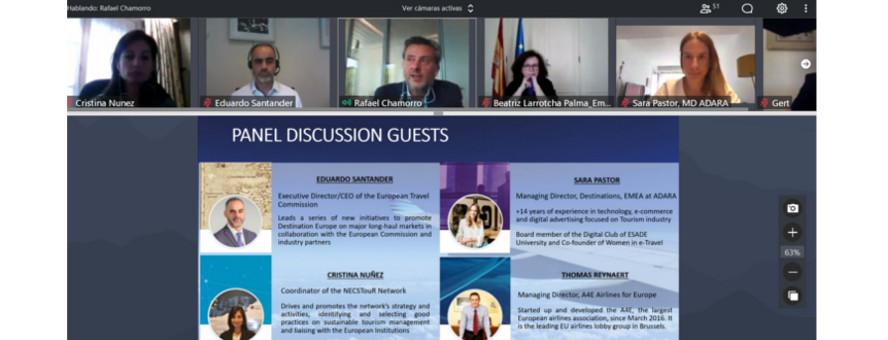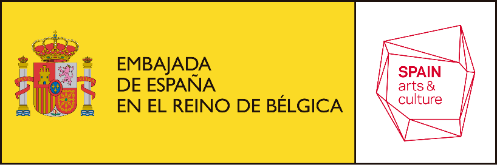Virtual round table on “The tourism sector in post-Covid-19 Europe: Challenges and opportunities”
On Wednesday, June 17th, from 11:00 to 12:30, the Embassy of Spain in the Kingdom of Belgium and the Spanish Tourist Office in Belgium, in collaboration with the Official Spanish Chamber of Commerce in Belgium and Luxembourg, organized a virtual round table on “The tourism sector in post-Covid-19 Europe: Challenges and opportunities”, a special edition that is part of the Mediodías de la Embajada events.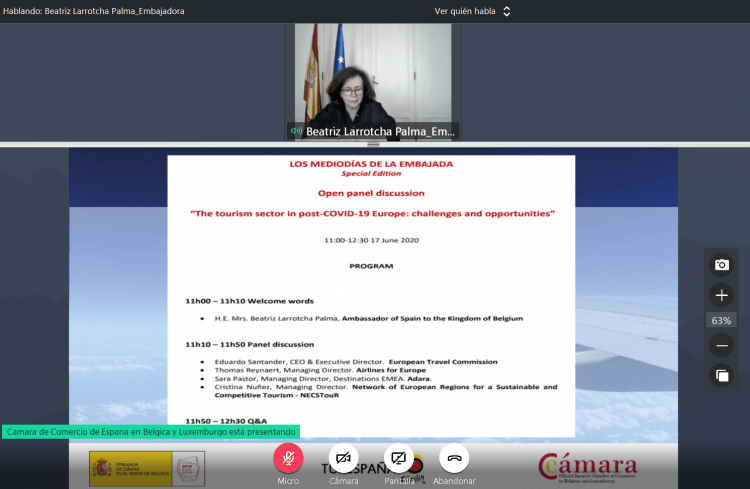
The debate was chaired by Rafael Chamorro, Director of Spanish Tourism Office in Belgium, and featured H. E. Ms. Beatriz Larrotcha Palma, Ambassador of Spain to the Kingdom of Belgium. For the roundtable the speakers were Eduardo Santander, CEO & Executive Director of European Travel Commission, Thomas Reynaert, Managing Director of Airlines for Europe, Sara Pastor, Managing Director, Destinations EMEA of Adara and Cristina Nuñez, Managing Director of Network of European Regions for a Sustainable and Competitive Tourism – NECSTouR.
The welcome words were given by H. E. Ms. Beatriz Larrotcha Palma, Ambassador of Spain to the Kingdom of Belgium, stating the importance of tourism for Spain and Europe and the great effort put in place by Spanish authorities to restore trust in Spain as a safe destination. The Ambassador also thanked all the organizers for the webinar as well as to all the attendants for their interest.
Following the welcome words, Rafael Chamorro, Director of Spanish Tourism Office in Belgium, Presented all the speakers and opened the roundtable by giving some key numbers about the critical importance of tourism sector not only for Spain but also for Europe as around 10% of EU’s GDP depends directly from this sector. Despite some disparities between EU countries, the economic importance of tourism in terms of employment and growth make compulsory for Europeans to be able to travel again with open borders.
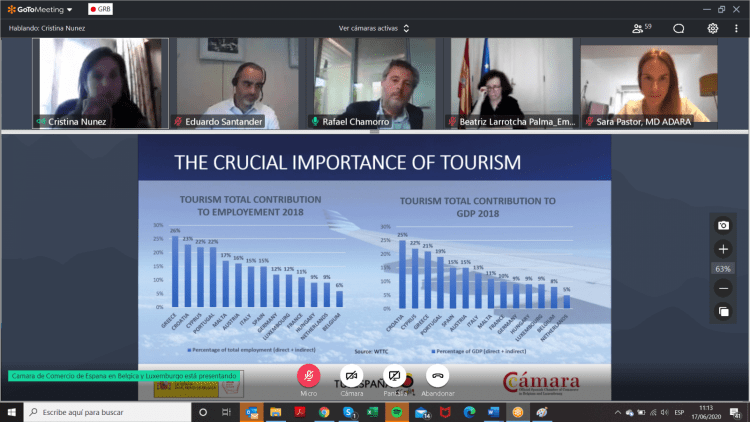 During the debate, Eduardo Santander, CEO & Executive Director of European Travel Commission, insisted in the fact that this crisis might be the perfect opportunity to rethink tourism once the health crisis is over. As some symptoms of the lack of sustainability arise earlier than the COVID-19 crisis, it is the perfect time to think in a future of tourism with a green mark that gives opportunities to regions that traditionally were not receiving much tourism (España vaciada) rather than coming back to unsustainable massified destinations.
During the debate, Eduardo Santander, CEO & Executive Director of European Travel Commission, insisted in the fact that this crisis might be the perfect opportunity to rethink tourism once the health crisis is over. As some symptoms of the lack of sustainability arise earlier than the COVID-19 crisis, it is the perfect time to think in a future of tourism with a green mark that gives opportunities to regions that traditionally were not receiving much tourism (España vaciada) rather than coming back to unsustainable massified destinations.
Thomas Reynaert, Managing Director of Airlines for Europe, gave his impressions on how severely this crisis has affected the airlines and how they are taking measures to recover from it. Airlines will also be key for the development of the green deal strategy in the near future in addition to some harmonization policies needed in the sector at the EU level. The speaker also highlighted the importance of individual responsibility in flights as long as the health crisis lasts even if the safety is completely ensured thanks to air technologies on planes.
Sara Pastor, Managing Director, Destinations EMEA of Adara, shared with the audience a general picture on how the crisis has been faced by the sector and how the data shows we are starting to rise the curve of reservations as Europeans have not lost their will to travel. This current scenario means that the right strategy to attract the tourists can make the difference for all actors in the sector (regions, hotels, airlines, etc.). A common strategy Europe-wide is needed to prevent comparative advantages (and disadvantages).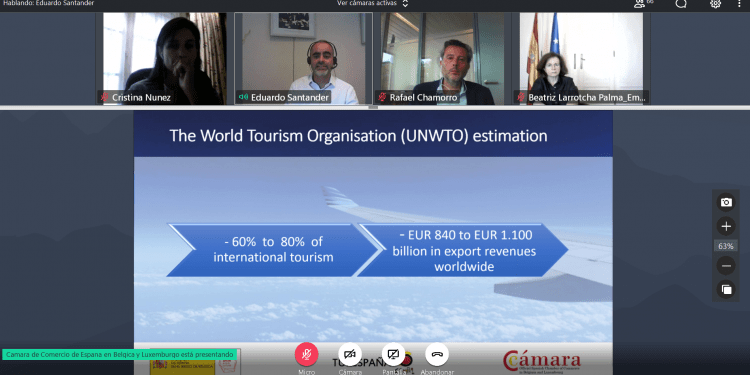
Cristina Nuñez, Managing Director of Network of European Regions for a Sustainable and Competitive Tourism – NECSTouR, highlighted the importance of regions in this sector recovery as it is crucial for them to keep attracting public attention by focusing on their strong points. She also agreed that this crisis can be a huge boost for rural areas or regions that traditionally were not among top destinations, therefore it is important to generate trust in the tourist that are looking for this non-massified destinations.
During the Q&A session, participants were able to raise questions of their interest. Some topics covered during this session were the need to restore trust in tourism or the opportunities given to rural areas.

